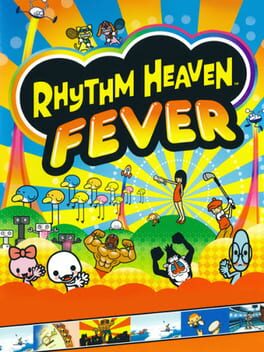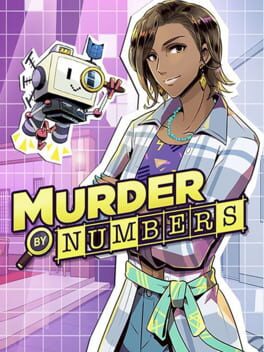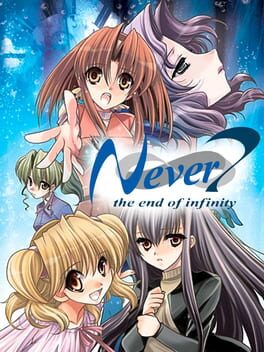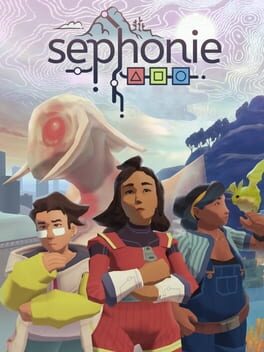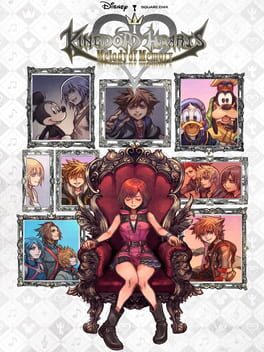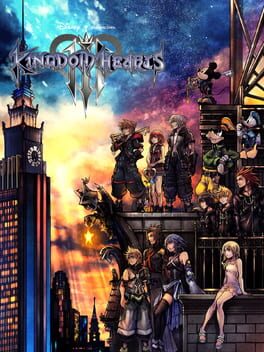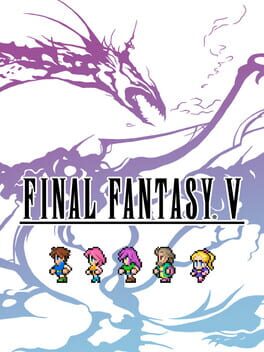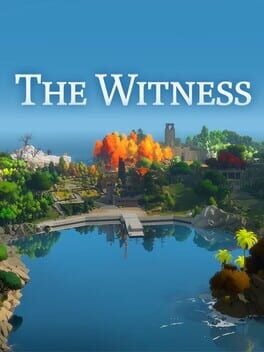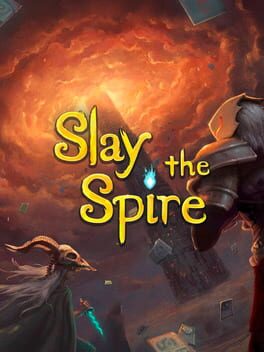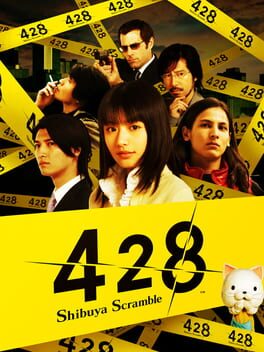LunaFlare
2011
2016
2020
This review contains spoilers
Murder By Numbers is a novel attempt to combine the classic puzzle gameplay of Picross with a mystery story that provides an actual framing device for the gameplay, presented in a visual novel style like Ace Attorney. I feel bad about how negative this review is going to be because I really appreciate what they were going for, but in the end, I just don't think it worked. Also, apologies in advance for comparing this game to Ace Attorney in literally every paragraph, it's kind of hard to avoid.
I don't want to damn with faint praise, but I also don't want to just write 5000 words of negativity, so I'll start off by saying that anything I don't mention in detail, like the actual Picross puzzles, is probably pretty good, if unremarkable. I don't think the game is lazy or incompetent at all, it's just sadly flawed in a number of ways that stack up to cause a subpar experience.
A fundamental place the idea of this game fails is in the connection between the mystery novel sections and the Picross gameplay. Like in Ace Attorney, much of the gameplay consists of scouring locations for evidence or interacting with evidence in the middle of a conversation. The issue is every piece of evidence you find or interact with takes the form of a Picross puzzle, and as the difficulty increases, each Picross constitutes a significant time investment to complete. This completely shatters the pacing of paying attention to the story. If they were short and easy enough to not disrupt the flow of the story, they would be worthless as actually interesting Picross puzzles. This is why I consider the problem fundamental - it's not just a matter of poor execution, I don't think you can use Picross as the interface to an active mystery story like this without seriously harming at least one of those aspects. That's not to say the execution is as good as it could be, though. Something I found particularly grating was the way the music would often (but not consistently!) transition to a jaunty puzzle tune while you solve a Picross even in the middle of a tense scene otherwise backed by dramatic music.
While we're discussing mechanics, let's go over some of my miscellaneous issues with the game design before launching into the story. This is going to sound like a minor point written out because there's not much to say about it, but to the player, it definitely comes across as a major issue. The engine for the visual novel sections of the game is just incredibly underbaked. There's no text log to check a line you missed, you can't skip past text you've seen before, and you can't even pause the game to save or change the settings until you come to a puzzle or investigation segment. For a game that's half visual novel, this is a pretty serious issue.
They tried to do something different with searching for evidence, and I really appreciate what they were going for here because the Ace Attorney pattern of clicking on every part of a pre-rendered background until you find the dialogue that advances the plot could really do with replacement. Unfortunately, I don't think the replacement they came up with is much better. Instead of selecting points of interest yourself, the background is covered in a sickly green filter as you sweep a scanning reticule over the location until a "hot and cold" flashing indicator lights up. On its own, this reduces the act of investigating a crime scene to sweeping over every pixel until you find the right hotspot, but it gets worse because trying to search based on the background illustration will often prove fruitless as there is little to no connection between the hotspot you search and the evidence you're looking for. As an arbitrary example, there's a point in the game where you're searching a crime scene with a body on a couch and a noticeably messy desk. While there is a hotspot on the body this time, something they don't always get right, the other hotspot is not on the desk at all, but rather an unremarkable piece of curtain. Upon solving the puzzle, you discover some alcohol spilled on the floor. You later return to the room, in the same state, and only now can find crucial evidence on the desk.
Another aspect that magnifies the issues with the "hot and cold" pixel hunt system is the game's scoring system. You get points for each Picross you solve, which are tallied up at the end of a chapter and unlock bonus puzzles you can play from the main menu. If you complete all of a chapter's bonus puzzles, you unlock a short cutscene with some character backstory. Given you're rewarded with both more gameplay and story, I'd say the player is pretty highly incentivised to complete all the puzzles in the game. To make sure this task isn't completely trivial, there are optional hotspots not needed to progress the story spread amongst the investigation segments. Unfortunately, due to the aforementioned issues with the hotspot system, this just increases the pressure to scour across every pixel of the screen making sure you haven't missed something. Mercifully the game does tell you when there's nothing left to find in an area, but as mentioned with the desk example what's available can change over time, and there isn't any indication of exactly when that happens. Furthermore, if you do miss a puzzle, it's not going to be obvious until you clear the entire chapter, at which point you have to play it all again - of course, without the ability to skip text. This is a miserable gameplay pattern to encourage, and while I'm definitely on board with the game having extra puzzles to play through, I don't think they should have been locked behind a tacked-on score system.
If there's one word I would use to describe the plot, it's "inconsistent", on both a small and large scale. On the large scale, the quality of the writing between each chapter seems to vary a fair bit, and my opinion shifted up and down in turn as the game progressed. On the small scale, the game has in its lower moments a massive problem with inconsistent tone. I don't just mean "oh no, the game is about a murder mystery but it's light-hearted," because when it's doing well it nails that about as well as Ace Attorney. I'm talking about jokes that are honestly just completely inappropriate, mixed in with occasional dashes of subject matter that is decidedly not at all light-hearted and hits far too close to home to be a part of the tone the game is aiming for. It's so strange, because like 80% of this game's writing is fine or even actively charming, and then suddenly the smooth-talking main villain will retort "Typical 'Hollyweird' liberal" and you'll be completely taken out of it.
Chapter 1 is possibly the lowest point of the game with respect to the story, which makes a really poor first impression. There's a really high concentration of the sort of joke I was talking about right out of the gate, and many of the characters you meet are not only flat but completely unsympathetic, which leads to a real issue with getting invested in things. The chapter's dramatic conclusion feels unearned with a disappointing lack of actual mystery, and it ends on a cliffhanger right after a twist for the sake of leaving threads for the endgame to pick up on.
In contrast, Chapter 2 really impressed me! Some of the characters, in particular the amnesiac robot main character, immediately show believable growth from the time passed between chapters instead of leaning on the same boring shtick, and by the end of the chapter even the flattest most irritating character from Chapter 1 has shown an interesting new side of herself. Unfortunately, this would turn out to be her last appearance in the game, while my least favourite character - the absolutely painful "fabulous" gay best friend stereotype - would stay on in the recurring cast. Without giving away any specific details, Chapter 2's overall structure initially appears to be quite a retread of the first's, but it subverts it in a way that I found quite entertaining.
Unfortunately, it was followed up by Chapter 3. Which is set in a drag bar. I should be happy for the gay rep, especially considering the game's competition in the genre, but I really can't find it in me to get excited about cis drag without a single acknowledgement of trans people at all. Haha, laugh at the old man as he gets confused about what pronouns to call a drag queen. Misgendering is my favourite light-hearted funny topic to laugh about. The actual story of the chapter is serviceable, but it suffers from the same problem as mid-game chapters in Ace Attorney where they've tried not to make every case tie into the game's overarching story for the sake of variety, but as a result, it just feels detached and hard to get invested in. This chapter also contains the bulk of the interaction with the main character's… abusive, manipulative, gaslighting ex-husband. Fun, light-hearted mystery story to go along with a chill puzzle game! At least she doesn't take any of his shit.
Chapter 4 is the game's final chapter, but it really feels like two chapters awkwardly combined into one, with the first half largely dedicated to a self-contained mystery that again is functional but hard to get invested in, and throughout it's intertwined with connections to the overarching mystery set up at the end of Chapter 1, which the game closes out with resolving. This is where any pretense that this is a serious review I'm writing breaks down because I don't have all that much to say about it, I didn't hate it but it didn't exactly thrill me either and I don't have the analysis skills to say exactly why.
I think, sadly, that's a pretty good summary of Murder By Numbers. I appreciate what it's trying to do and I wish it was better, but it's just got so many problems, even though most of them are small, that most of the experience of playing the game is noticing them. It feels denigrating to all the hard work the developers put in to say that it'd be better off as just a collection of Picross puzzles, and I don't think they shouldn't have tried what they did, but it's just impossible for me to say that I think they succeeded.
I don't want to damn with faint praise, but I also don't want to just write 5000 words of negativity, so I'll start off by saying that anything I don't mention in detail, like the actual Picross puzzles, is probably pretty good, if unremarkable. I don't think the game is lazy or incompetent at all, it's just sadly flawed in a number of ways that stack up to cause a subpar experience.
A fundamental place the idea of this game fails is in the connection between the mystery novel sections and the Picross gameplay. Like in Ace Attorney, much of the gameplay consists of scouring locations for evidence or interacting with evidence in the middle of a conversation. The issue is every piece of evidence you find or interact with takes the form of a Picross puzzle, and as the difficulty increases, each Picross constitutes a significant time investment to complete. This completely shatters the pacing of paying attention to the story. If they were short and easy enough to not disrupt the flow of the story, they would be worthless as actually interesting Picross puzzles. This is why I consider the problem fundamental - it's not just a matter of poor execution, I don't think you can use Picross as the interface to an active mystery story like this without seriously harming at least one of those aspects. That's not to say the execution is as good as it could be, though. Something I found particularly grating was the way the music would often (but not consistently!) transition to a jaunty puzzle tune while you solve a Picross even in the middle of a tense scene otherwise backed by dramatic music.
While we're discussing mechanics, let's go over some of my miscellaneous issues with the game design before launching into the story. This is going to sound like a minor point written out because there's not much to say about it, but to the player, it definitely comes across as a major issue. The engine for the visual novel sections of the game is just incredibly underbaked. There's no text log to check a line you missed, you can't skip past text you've seen before, and you can't even pause the game to save or change the settings until you come to a puzzle or investigation segment. For a game that's half visual novel, this is a pretty serious issue.
They tried to do something different with searching for evidence, and I really appreciate what they were going for here because the Ace Attorney pattern of clicking on every part of a pre-rendered background until you find the dialogue that advances the plot could really do with replacement. Unfortunately, I don't think the replacement they came up with is much better. Instead of selecting points of interest yourself, the background is covered in a sickly green filter as you sweep a scanning reticule over the location until a "hot and cold" flashing indicator lights up. On its own, this reduces the act of investigating a crime scene to sweeping over every pixel until you find the right hotspot, but it gets worse because trying to search based on the background illustration will often prove fruitless as there is little to no connection between the hotspot you search and the evidence you're looking for. As an arbitrary example, there's a point in the game where you're searching a crime scene with a body on a couch and a noticeably messy desk. While there is a hotspot on the body this time, something they don't always get right, the other hotspot is not on the desk at all, but rather an unremarkable piece of curtain. Upon solving the puzzle, you discover some alcohol spilled on the floor. You later return to the room, in the same state, and only now can find crucial evidence on the desk.
Another aspect that magnifies the issues with the "hot and cold" pixel hunt system is the game's scoring system. You get points for each Picross you solve, which are tallied up at the end of a chapter and unlock bonus puzzles you can play from the main menu. If you complete all of a chapter's bonus puzzles, you unlock a short cutscene with some character backstory. Given you're rewarded with both more gameplay and story, I'd say the player is pretty highly incentivised to complete all the puzzles in the game. To make sure this task isn't completely trivial, there are optional hotspots not needed to progress the story spread amongst the investigation segments. Unfortunately, due to the aforementioned issues with the hotspot system, this just increases the pressure to scour across every pixel of the screen making sure you haven't missed something. Mercifully the game does tell you when there's nothing left to find in an area, but as mentioned with the desk example what's available can change over time, and there isn't any indication of exactly when that happens. Furthermore, if you do miss a puzzle, it's not going to be obvious until you clear the entire chapter, at which point you have to play it all again - of course, without the ability to skip text. This is a miserable gameplay pattern to encourage, and while I'm definitely on board with the game having extra puzzles to play through, I don't think they should have been locked behind a tacked-on score system.
If there's one word I would use to describe the plot, it's "inconsistent", on both a small and large scale. On the large scale, the quality of the writing between each chapter seems to vary a fair bit, and my opinion shifted up and down in turn as the game progressed. On the small scale, the game has in its lower moments a massive problem with inconsistent tone. I don't just mean "oh no, the game is about a murder mystery but it's light-hearted," because when it's doing well it nails that about as well as Ace Attorney. I'm talking about jokes that are honestly just completely inappropriate, mixed in with occasional dashes of subject matter that is decidedly not at all light-hearted and hits far too close to home to be a part of the tone the game is aiming for. It's so strange, because like 80% of this game's writing is fine or even actively charming, and then suddenly the smooth-talking main villain will retort "Typical 'Hollyweird' liberal" and you'll be completely taken out of it.
Chapter 1 is possibly the lowest point of the game with respect to the story, which makes a really poor first impression. There's a really high concentration of the sort of joke I was talking about right out of the gate, and many of the characters you meet are not only flat but completely unsympathetic, which leads to a real issue with getting invested in things. The chapter's dramatic conclusion feels unearned with a disappointing lack of actual mystery, and it ends on a cliffhanger right after a twist for the sake of leaving threads for the endgame to pick up on.
In contrast, Chapter 2 really impressed me! Some of the characters, in particular the amnesiac robot main character, immediately show believable growth from the time passed between chapters instead of leaning on the same boring shtick, and by the end of the chapter even the flattest most irritating character from Chapter 1 has shown an interesting new side of herself. Unfortunately, this would turn out to be her last appearance in the game, while my least favourite character - the absolutely painful "fabulous" gay best friend stereotype - would stay on in the recurring cast. Without giving away any specific details, Chapter 2's overall structure initially appears to be quite a retread of the first's, but it subverts it in a way that I found quite entertaining.
Unfortunately, it was followed up by Chapter 3. Which is set in a drag bar. I should be happy for the gay rep, especially considering the game's competition in the genre, but I really can't find it in me to get excited about cis drag without a single acknowledgement of trans people at all. Haha, laugh at the old man as he gets confused about what pronouns to call a drag queen. Misgendering is my favourite light-hearted funny topic to laugh about. The actual story of the chapter is serviceable, but it suffers from the same problem as mid-game chapters in Ace Attorney where they've tried not to make every case tie into the game's overarching story for the sake of variety, but as a result, it just feels detached and hard to get invested in. This chapter also contains the bulk of the interaction with the main character's… abusive, manipulative, gaslighting ex-husband. Fun, light-hearted mystery story to go along with a chill puzzle game! At least she doesn't take any of his shit.
Chapter 4 is the game's final chapter, but it really feels like two chapters awkwardly combined into one, with the first half largely dedicated to a self-contained mystery that again is functional but hard to get invested in, and throughout it's intertwined with connections to the overarching mystery set up at the end of Chapter 1, which the game closes out with resolving. This is where any pretense that this is a serious review I'm writing breaks down because I don't have all that much to say about it, I didn't hate it but it didn't exactly thrill me either and I don't have the analysis skills to say exactly why.
I think, sadly, that's a pretty good summary of Murder By Numbers. I appreciate what it's trying to do and I wish it was better, but it's just got so many problems, even though most of them are small, that most of the experience of playing the game is noticing them. It feels denigrating to all the hard work the developers put in to say that it'd be better off as just a collection of Picross puzzles, and I don't think they shouldn't have tried what they did, but it's just impossible for me to say that I think they succeeded.
This review contains spoilers
I have a lot of thoughts on this one so I'm not quite sure where to start. Going in, I knew two things about Vanillaware: their visuals are gorgeous and their fanservice is skeevy. Both are true here in equal measure. I can't imagine how much effort drawing all of the backgrounds and character poses took, but god I wish one of those poses wasn't a 15-year-old's panty shot. People complain about Kotaro Uchikoshi being horny but at least his subjects are legal.
The plot was certainly interesting. It's already a Lot right out of the gate, so I was initially worried that its reputation was more about volume than anything else, but I was impressed by the development from that starting point. My mind had a lot to chew on in the middle stages, and there were some interesting late reveals. I put together some details before the game confirmed it, but in a way that felt intended and satisfying. It's pretty interesting how the big reframing twist isn't a sudden 11th hour thing, but a slow burn you get more and more context for over time. All this praise said, I don't think the narrative structure is quite as revolutionary as the most devoted fans say. It's basically just 428 Shibuya Scramble with some wonky chronology. And don't get me wrong, that's a good thing to be! When I first put the game down, I came away without any particular feeling of "wow", but after more than a week of my brain constantly chewing on the details of the plot I have to admit that I'm charmed.
I do have to mention that I have some conflicted feelings about queer representation in this game. The writing around Okino and Hijiyama constantly waffles between a great depiction of a confident and proud genderfluid person and their boyfriend who's coming to terms with his first gay feelings, and... "lol tr*ps are gay". On the WLW side of things we have a girl extremely devoted to her childhood friend... who turn out to be clones of a mother and daughter, and one single line between two characters already paired off with boys at that point. So that's a total bust.
On the gameplay side of things, I'm not quite sure how to feel. Going in I was very worried to hear that the game had mandatory RTS segments, and I was imagining something like Starcraft where you have to keep tabs on everything and work fast, which would overwhelm me easily. Thankfully, it's not like that, it's more like a active-time RPG. I found the combat enjoyable, shooting a hailstorm of bullets into a huge crowd of enemies and watching the fireworks is very fun.However, the frontloaded complexity of the upgrade system is what pushed me over the edge into setting the difficulty to "casual" and focusing on the story. As soon as the tutorial teaches you about upgrades, you have about 100 options and no idea how to prioritise them. I'm glad Casual difficulty is an option, but I feel like more could have been done to make actually engaging with the combat a more accessible option.
While I'm complaining, I do want to touch on the localisation a little bit. "Sub-style" translations using honourifics and untranslated terms like "yakisoba pan" are valid and in a vacuum I don't mind it here, but if you're going to do it alongside an English dub, please for the love of god train your actors to pronounce Japanese phonemes. "Tam-ow". Ow indeed.
Overall though I did very much enjoy my time with it and I got invested in it, I'm just not quite as high on it as some of the praise I've seen.
The plot was certainly interesting. It's already a Lot right out of the gate, so I was initially worried that its reputation was more about volume than anything else, but I was impressed by the development from that starting point. My mind had a lot to chew on in the middle stages, and there were some interesting late reveals. I put together some details before the game confirmed it, but in a way that felt intended and satisfying. It's pretty interesting how the big reframing twist isn't a sudden 11th hour thing, but a slow burn you get more and more context for over time. All this praise said, I don't think the narrative structure is quite as revolutionary as the most devoted fans say. It's basically just 428 Shibuya Scramble with some wonky chronology. And don't get me wrong, that's a good thing to be! When I first put the game down, I came away without any particular feeling of "wow", but after more than a week of my brain constantly chewing on the details of the plot I have to admit that I'm charmed.
I do have to mention that I have some conflicted feelings about queer representation in this game. The writing around Okino and Hijiyama constantly waffles between a great depiction of a confident and proud genderfluid person and their boyfriend who's coming to terms with his first gay feelings, and... "lol tr*ps are gay". On the WLW side of things we have a girl extremely devoted to her childhood friend... who turn out to be clones of a mother and daughter, and one single line between two characters already paired off with boys at that point. So that's a total bust.
On the gameplay side of things, I'm not quite sure how to feel. Going in I was very worried to hear that the game had mandatory RTS segments, and I was imagining something like Starcraft where you have to keep tabs on everything and work fast, which would overwhelm me easily. Thankfully, it's not like that, it's more like a active-time RPG. I found the combat enjoyable, shooting a hailstorm of bullets into a huge crowd of enemies and watching the fireworks is very fun.However, the frontloaded complexity of the upgrade system is what pushed me over the edge into setting the difficulty to "casual" and focusing on the story. As soon as the tutorial teaches you about upgrades, you have about 100 options and no idea how to prioritise them. I'm glad Casual difficulty is an option, but I feel like more could have been done to make actually engaging with the combat a more accessible option.
While I'm complaining, I do want to touch on the localisation a little bit. "Sub-style" translations using honourifics and untranslated terms like "yakisoba pan" are valid and in a vacuum I don't mind it here, but if you're going to do it alongside an English dub, please for the love of god train your actors to pronounce Japanese phonemes. "Tam-ow". Ow indeed.
Overall though I did very much enjoy my time with it and I got invested in it, I'm just not quite as high on it as some of the praise I've seen.
Pacing-wise, the balance of "interesting sci-fi mystery" to "slice of life dating sim" is more evenly distributed than the infamously backloaded Ever 17, but on the whole there's a lot more focus on the latter than most of Uchikoshi's other work. From the perspective of "an Uchikoshi VN" it's mostly a curiosity, as the origin of some elements referenced in the other Infinity games - though it's certainly not without some interesting aspects. The Never 7 Eternal Edition fan remake is an amazing work of preservation though, lined up against a host of ports with inconsistent content and bugs galore.
E: OK, honestly, every time I think about this game I give it more credit for its interesting ideas. I need to do a replay with the intent of meeting it on its own terms.
E: OK, honestly, every time I think about this game I give it more credit for its interesting ideas. I need to do a replay with the intent of meeting it on its own terms.
2022
This was billed to me by both friends and Steam as "Mirror's Edge meets The Witness", and both comparisons are... a bit generous, I think. The platforming is pretty finicky, and the puzzles are disappointing. A bit short for the price too. The story seems philosophical and introspective and is probably the game's high point, but going in expecting refined quality from the gameplay I wasn't in the headspace to be receptive to it.
Look, I'm sure there are dedicated Rhythm games out there that are way better at being That. But I can't imagine any of them officially have Yoko Shimomura's legendary work on the Kingdom Hearts series, and the battle aesthetic of the charts is extremely stylish. I'm deep in the modding scene and have done a fair bit of score chasing, with a Platinum III rank on the community Discord's system.
2017
2019
Complicated feelings on this game. Much discourse. The cleanest way to put it is that, partially because it shaped my tastes, KH2 gives me more of what I'm personally looking for. KH3 is still a very fine game, but trying to replay it I find that it contains many segments that make it difficult because you'd rather just skip them, and they don't interact with any challenges or mods that the replay was for.
2021
2016
2019
I very much enjoyed this Sound Novel. It's kind of a fun shlocky action flick plot, but it's elevated by the real photography, the soundtrack, and the gameplay system of routes that interlock through your choices. It also, strangely for a visual novel, has quite the extensive postgame, which I experienced all of, and that adds quite a lot of breadth to the experience. There are some interface issues though, like a slow text speed, bad skipping capability, and no mouse support.
2019
This game kind of came out of nowhere for me, I just discovered it one day, gave it a chance, and was delighted to discover that it's gay as hell, as well as just a little bit trans! The added voice work really elevates it, and my ADHD brain appreciates that it's more than just a slow burn romance, with some dramatic fantasy elements included too.
